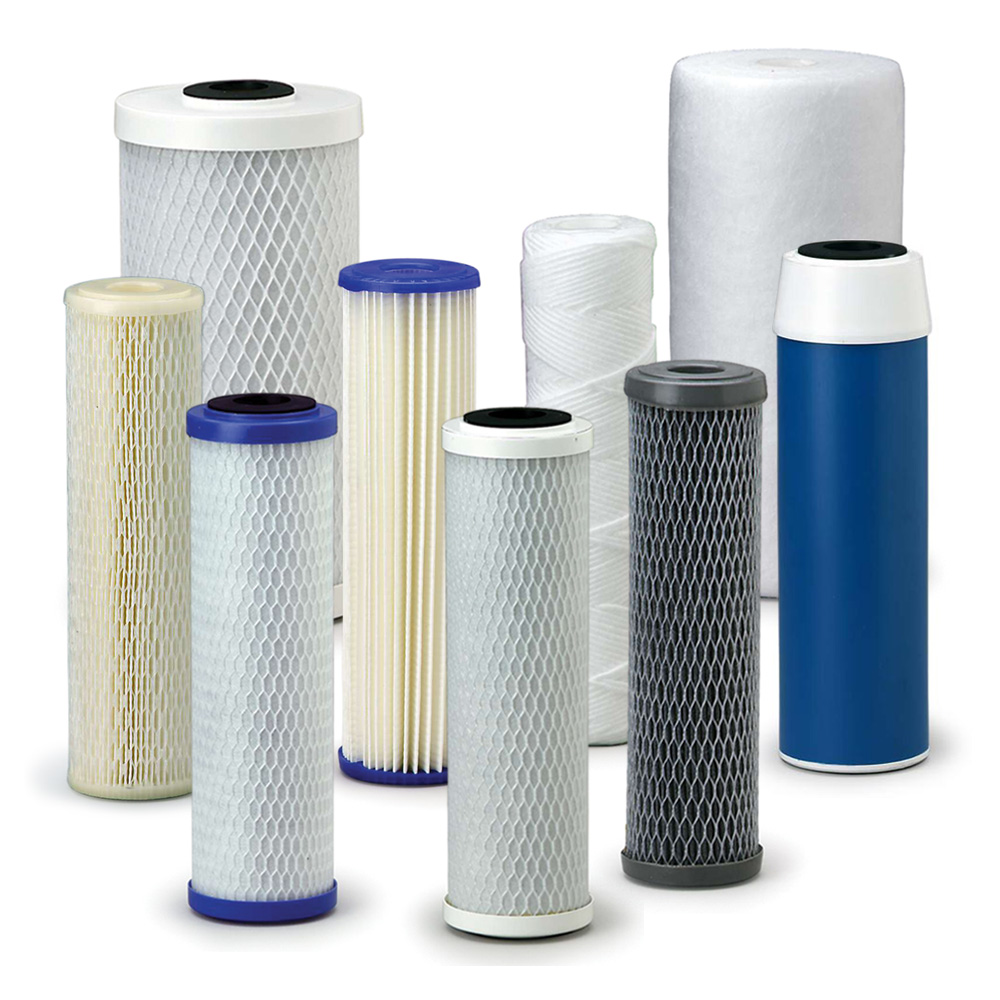Maximizing Filtration Efficiency: A Comprehensive Guide to Filter Cartridges
Filter cartridges are essential components of filtration systems used to remove contaminants from fluids, such as water or air. These cylindrical devices contain various types of filter media, ranging from depth filters to activated carbon, designed to capture and separate particles, impurities, and microorganisms from fluids as they pass through. Filter cartridges find applications in a wide range of industries, from water treatment and industrial processes to healthcare and automotive, ensuring the purity and quality of fluids for various purposes. Regular maintenance and replacement are crucial to maintain their efficiency and effectiveness in filtration processes.
Filter Cartridge Selection Considerations.

Clean and pure water is a fundamental necessity for human life, industry, and the environment. Achieving this cleanliness often requires advanced filtration techniques, and one critical component in these systems is the filter cartridge. Filter cartridges are an integral part of filtration systems used in various applications, including water treatment, air purification, and industrial processes. In this comprehensive guide, we will delve into the world of filter cartridges, exploring their types, functions, applications, and maintenance, to help you understand how they play a vital role in ensuring the quality of the fluids we rely on every day.
Meaning of Filter Cartridges
A filter cartridge is a cylindrical device designed for use in filtration systems to remove impurities, contaminants, or particles from fluids such as water or air as they pass through. Filter cartridges typically consist of a casing or housing that contains a specific filter media or material, which is chosen based on the type of contaminants to be removed and the intended application.
Filter cartridges serve a crucial role in various industries and applications. They are used in municipal water treatment plants to ensure safe drinking water, in industrial processes to maintain product quality and meet regulatory standards, in healthcare settings to maintain sterile conditions, and in HVAC systems to improve indoor air quality. The efficiency and effectiveness of filter cartridges are vital in ensuring that fluids are free from contaminants and suitable for their intended purposes.
Understanding Filter Cartridges
Filter cartridges are cylindrical devices designed to remove contaminants from fluids, such as water or air, as they pass through. They consist of a porous material or filter media enclosed within a casing or cartridge housing. The filter media can be made from a variety of materials, including paper, polyester, polypropylene, ceramic, or metal, depending on the intended use and the type of contaminants to be removed.
Types of Filter Cartridges
Filter cartridges come in various types, each tailored to specific applications and filtration needs:
- Depth Filter Cartridges: These cartridges use a dense matrix of fibers to trap particles as fluid flows through. Depth filters are effective at removing particles of various sizes and can handle high dirt-holding capacity. They are commonly used in applications like water filtration and pre-filtration in industrial processes.
- Pleated Filter Cartridges: Pleated cartridges have a folded or pleated design that increases the surface area for filtration. This design enhances their efficiency in capturing smaller particles and extending their lifespan. Pleated filter cartridges are often used in residential water filtration systems and HVAC systems.
- Membrane Filter Cartridges: Membrane filters use a thin, semi-permeable membrane to separate particles from the fluid. They are highly effective at removing microorganisms, bacteria, and fine particulate matter. Membrane filter cartridges are commonly employed in pharmaceutical, biotechnology, and food and beverage industries where sterile filtration is critical.
- Activated Carbon Filter Cartridges: These cartridges contain activated carbon granules that adsorb contaminants like chlorine, volatile organic compounds (VOCs), and odors from the fluid. They are extensively used in water purification systems, aquariums, and air purification applications.

Functions of Filter Catridges
Filter cartridges serve several essential functions in filtration systems, and these functions primarily revolve around their ability to remove contaminants and particles from fluids like water or air. Here are the key functions of filter cartridges:
- Particle Removal: One of the primary functions of filter cartridges is to remove particles and solid contaminants from fluids. The filter media inside the cartridge traps these particles, preventing them from passing through and contaminating the fluid downstream.
- Fluid Clarification: Filter cartridges are often used to clarify fluids by removing suspended solids, sediments, and impurities. This function is crucial in applications such as water treatment, where clear and clean water is required.
- Microorganism Removal: In some specialized filter cartridges, particularly membrane filter cartridges, the function goes beyond particle removal. They are capable of removing microorganisms such as bacteria, viruses, and fungi, making them essential in industries like pharmaceuticals and biotechnology.
- Chemical Adsorption: Certain filter cartridges, such as activated carbon filter cartridges, have the function of adsorbing or removing specific chemicals and impurities from fluids. They are used to eliminate contaminants like chlorine, volatile organic compounds (VOCs), and unpleasant odors.
- Fluid Sterilization: Membrane filter cartridges are employed to achieve sterile filtration, ensuring that fluids are free from microorganisms. This function is vital in healthcare settings, laboratories, and industries requiring sterile processes.
- Maintaining Product Quality: In industrial processes, filter cartridges play a crucial role in maintaining the quality of products. They help prevent contaminants from affecting the integrity of chemicals, pharmaceuticals, food products, and more.
- Environmental Protection: Filter cartridges are used to protect the environment by removing pollutants and contaminants from wastewater before it is discharged. This function helps maintain water quality and safeguards ecosystems.
- Improving Air Quality: In HVAC (Heating, Ventilation, and Air Conditioning) systems, filter cartridges are used to remove dust, pollen, allergens, and other particulate matter from the air, improving indoor air quality and ensuring healthier environments.
Importance of Filter cartridges
The importance of filter cartridges in various industries and applications cannot be overstated. These essential components of filtration systems offer numerous benefits and serve critical functions that have a profound impact on the quality, safety, and efficiency of processes and products. Here are some of the key reasons why filter cartridges are important:
- Contaminant Removal: Filter cartridges effectively remove particles, impurities, microorganisms, and chemicals from fluids. This function is crucial for ensuring the purity and safety of drinking water, maintaining product quality in industrial processes, and preventing contamination in healthcare and laboratory settings.
- Safety and Health: In applications such as drinking water treatment and healthcare, filter cartridges play a vital role in safeguarding public health. They help eliminate harmful pathogens, bacteria, viruses, and contaminants that can lead to illnesses and diseases if left untreated.
- Environmental Protection: Filter cartridges are instrumental in protecting the environment by removing pollutants and contaminants from wastewater before discharge. This prevents water pollution and helps maintain the health of aquatic ecosystems.
- Quality Control: Industries such as pharmaceuticals, food processing, and electronics manufacturing rely on filter cartridges to control product quality. They ensure that final products meet stringent quality standards by removing contaminants that could compromise the integrity of these products.
- Process Efficiency: Filter cartridges help maintain the efficiency of industrial processes by preventing the clogging of equipment, minimizing downtime, and reducing maintenance costs. This results in improved operational efficiency and cost savings.
- Energy Efficiency: In some applications, such as in automotive manufacturing, filter cartridges contribute to energy efficiency by maintaining the quality of coolants and lubricants. This can lead to reduced energy consumption and lower operating costs.
- Versatility: Filter cartridges come in various types and can be customized to suit specific filtration needs. Their versatility allows them to be used in a wide range of applications across different industries.

Applications of Filter Cartridges
Filter cartridges find applications across various industries and sectors:
- Water Treatment: In municipal water treatment plants and residential water filtration systems, filter cartridges are used to remove sediment, bacteria, algae, and other impurities from drinking water, ensuring it meets safety standards.
- Industrial Processes: Industries such as pharmaceuticals, chemicals, and food processing rely on filter cartridges to maintain product quality, control contamination, and meet regulatory requirements.
- Automotive: Automotive manufacturing involves several fluid filtration processes, where filter cartridges are crucial for maintaining the integrity of lubricants and coolants.
- Healthcare: Hospitals and laboratories use filter cartridges for air and water purification to ensure a sterile and safe environment.
- HVAC Systems: Filter cartridges help improve indoor air quality by removing dust, pollen, and allergens from the air circulated within buildings.
Filter Cartridge Selection Considerations
When choosing a filter cartridge for a specific application, several factors must be considered:
- Contaminant Type and Size: The nature and size of the contaminants determine the choice of filter media and filtration efficiency required.
- Flow Rate: The rate at which fluid flows through the cartridge affects filtration performance. Proper sizing is crucial to maintain efficiency.
- Temperature and Chemical Compatibility: Filter cartridges must be compatible with the fluid's temperature and chemical composition to prevent degradation.
- Lifespan and Maintenance: Different cartridges have varying lifespans and maintenance requirements. Some can be cleaned and reused, while others need regular replacement.
Maintenance and Replacement
Proper maintenance of filter cartridges is essential to ensure consistent performance. Depending on the type and application, filter cartridges may need periodic replacement or cleaning. Here are some maintenance tips:
- Regular Inspection: Periodically inspect the filter cartridge for signs of wear, damage, or clogging. A clogged filter can lead to reduced flow rates and decreased efficiency.
- Cleaning: Some filter cartridges can be cleaned and reused. Follow the manufacturer's guidelines for cleaning procedures and frequency.
- Replacement: For disposable filter cartridges, adhere to the recommended replacement schedule. Overused cartridges can become less effective and may even allow contaminants to pass through.
Filter cartridges play a pivotal role in maintaining the quality of fluids, be it water or air, in various applications and industries. Understanding the different types of filter cartridges, their applications, and the factors to consider when selecting them is crucial for ensuring efficient filtration and system performance. Regular maintenance and replacement, when necessary, are key to preserving the integrity of the filtration process.
As technology advances and the need for clean and pure fluids continues to grow, filter cartridges will undoubtedly evolve to meet the ever-increasing demands for higher efficiency, longer lifespan, and broader applicability. Whether it's providing safe drinking water, maintaining product quality in industries, or improving indoor air quality, filter cartridges remain a cornerstone of filtration systems worldwide, contributing to the well-being of individuals and the sustainability of our environment.



